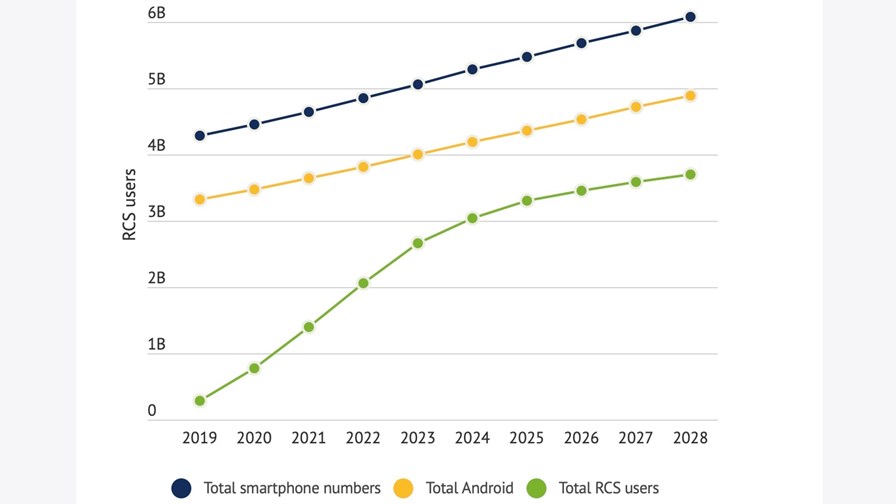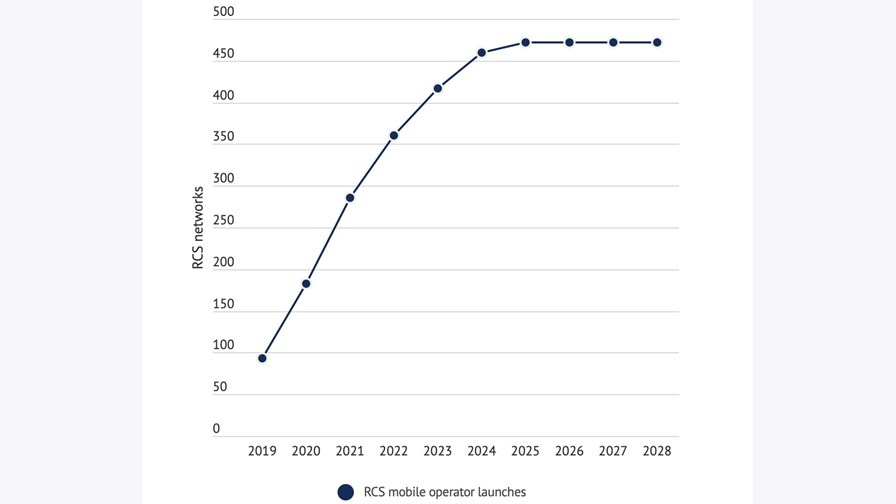
Chart courtesy of Mobilesquared from the report 'RCS: The game changer the industry has been waiting for'
- Many mobile operators have persevered with Rich Communication Services (RCS)
- User numbers have been growing
- Now a new report suggests there might be a hint of gold in them thar RCS hills
- But a number of stars need to align for this to make a meaningful impact
Rich Communication Services (RCS), the protocol designed to help CSPs play a role beyond SMS in the mobile messaging market, appears to be somewhat more than resilient than many had expected. And now, a new report suggests, as RCS user numbers grow, the potential of the RCS platform to be more than just a replacement for SMS is growing and advertising revenues could help boost the return-on-investment (ROI) potential of the advanced messaging system.
RCS has been much maligned over the years, regarded as a fool’s errand by some industry commentators – a pointless attempt by the mobile operator community to react to the massive success of Web-based messaging platforms such as WhatsApp WeChat, Twitter et al, which are used aplenty by the world’s smartphone community, but which bypass the coffers of the mobile network operators.
But despite faltering efforts, mobile operators have persevered with RCS, and its potential was significantly enhanced when Google joined the RCS camp, integrated it with its ubiquitous Android operating system, threw its R&D weight behind the development of RCS applications and started collaborating with operators. (See What’s up with… GTT, IoT, RCS, T-Mobile and Google Join Forces to Expand Rich Messaging (RCS) and Chinese telcos throw RCS a lifeline with 5G messaging service.)
In fact, Google has just announced that it is making RCS capabilities available to all Android users globally (except in China, Russia, Iran and Cuba) and is working on end-to-end encryption for the service, reports The Verge.
It should be noted, though, that while the online giant has helped to underpin and strengthen the RCS sector, Google’s strategy is also muddying the RCS waters: As well as working with some CSPs, it also has its own dedicated RCS platform that won’t necessarily interconnect with mobile operator RCS systems, fragmenting the market. (But that’s a story for another day…)
That fly-in-the-ointment aside, mobile operator RCS user numbers are creeping up. In Japan. the three main operators (KDDI, NTT DOCOMO and SoftBank) collaborated to jointly develop a service called +Message, based on Synchronoss's Advanced Messaging Platform: That service was launched in May 2018 and the number of users has just passed 20 million, SoftBank reported last week (see this announcement in Japanese).
Now a report from Mobilesquared, in association with mobile advertising agency Out There Media, predicts that major brands will divert increasing chunks of their advertising investments to RCS platforms and positively impact mobile operators’ revenue lines.
According to Mobilesquared, there are currently 183 mobile operators offering RCS-enabled services (see the chart below), with a potential user base of about 773 million (see the chart above). The research company expects those numbers to increase during the next few years, with an expected 472 service providers offering RCS-based services to about 3.3 billion potential users in 2025.

Chart courtesy of Mobilesquared from the report 'RCS: The game changer the industry has been waiting for'
Potential users, of course, does not mean guaranteed the use of embedded RCS-enabled messaging services, or regular use of any RCS-enabled applications, but current trends suggest the potential, at least, exists.
So what does this mean for operator revenues from advertising? Well, the report suggests there could be a significant opportunity as companies shift away from digital advertising opportunities that are deemed ineffective (such as banner advertising) to more targeted opportunities. Here’s what the report has to say:
“Mobilesquared expect brands to start shifting their digital media spend away from banners onto RCS in 2021 reaching $200 million in 2022, growing to $1.27 billion in 2024, before accelerating - effectively doubling year-on-year from 2023 onwards - to $16.91 billion in 2028. Brands are already spending on business messaging on SMS and a percentage of this spend will migrate onto RCS where their spend will multiply because of the exponential increase in interactions and engagements with consumers. But this spend comes from a different pot to the digital media budget.”
But that’s just part of the story: RCS media has other potential uses, and Mobilesquared has identified three avenues of revenue generation for RCS:
“Firstly, there is the traditional ‘telco model’, which is based on brands that already set aside budget for SMS campaigns and activity, and plan to extend that onto RCS.
Secondly is the ‘P2A [person to application] customer care’ evolution, with call centres adopting messaging to replace IVR with RCS in particular. Here brands will migrate budget set aside for customer care and/or call centres onto RCS.
And thirdly… is the migration of digital media spend onto RCS.
Combined these avenues highlight the enormous potential of RCS.
As a new platform, RCS will be attracting total brand spend of $1.5 billion by 2022, rising to $11 billion in 2024, before enjoying significant growth up to 2028 when brands will be spending $52.5 billion on the platform.”
For further details and insight, you can access the full report right here.
But before anyone gets too excited, there are a few caveats.
First, even if that $52.5 billion target is reached, mobile operators won’t be getting all the money. There are multiple players in the RCS value chain, including agencies, platform hosting companies, aggregators and more. The report’s author Nick Lane says mobile operators should be able to command a decent chunk of any spend, but the size of that chunk will vary from operator to operator.
Also, while that’s a lot of money, it’s also an aggregate: Large operators might see a large cut of billions, small operators might see a small cut of diddly squat. So mobile operator accountancy teams shouldn’t get excited, though any incremental revenues wold, of course, be welcome.
But even if RCS service uptake reaches anything like the numbers suggested in the report, to what level would mobile users opt-in to receive RCS-delivered advertising campaigns or support messages or any other kind of communications via that particular app? What other options might emerge in the next few years (consider how TikTok came from nowhere to be such a global sensation within a very short space of time that even the President of the USA knew what it was…)
Making predictions isn’t an easy science, getting predictions right it very tough indeed. There’s little doubt there’s momentum behind RCS and, as the Japanese operators have shown, there is some appetite to use the applications.
But it also seems like there are many pieces of a large puzzle that would all need to fall into place for this to making a meaningful impact on the financial situation of many mobile service providers. Currently, the pace of change in the communications services and associated cloud platform sector is accelerating – the market is shifting rapidly. How will media be consumed in 2025, let alone 2028? The forecast here seems to rest on a major shift in advertiser strategy, but little change to the other puzzle parts that would influence mobile-based media delivery.
Of course, let’s not discount the possibility that RCS might become a de facto messaging champion and drive even greater spend and revenues. Who’s to know. But, history suggests it’s more likely to be something of a windfall, something of a bonus that will help underpin an RCS ROI story, but not something that will move the needle on an operator’s fortunes.
Let’s take stock in 2028.
- Ray Le Maistre, Editorial Director, TelecomTV
Email Newsletters
Sign up to receive TelecomTV's top news and videos, plus exclusive subscriber-only content direct to your inbox.




